A Classification Scheme for Credit Card Fraud Detection in Data Mining
VerifiedAdded on 2022/09/15
|12
|2212
|15
Report
AI Summary
This report proposes a classification scheme for credit card fraud detection using data mining techniques. It highlights the increasing sophistication of credit card fraud due to the rise in online transactions and the necessity for secure transaction methods. The study aims to evaluate the use of data mining technology, specifically classification schemes, in detecting fraudulent activities. It covers the concept of credit card hacking, various hacking methods, and the application of data mining in fraud detection, ultimately recommending strategies to reduce credit card fraud. The research methodology includes a literature review of existing studies, with a project plan outlining timelines and deliverables. Ethical considerations such as obtaining consent, protecting privacy, and ensuring data integrity are addressed. The report concludes by emphasizing the importance of data mining in analyzing spending behavior and detecting uncommon patterns indicative of fraudulent activity, supported by a project timeline and references.
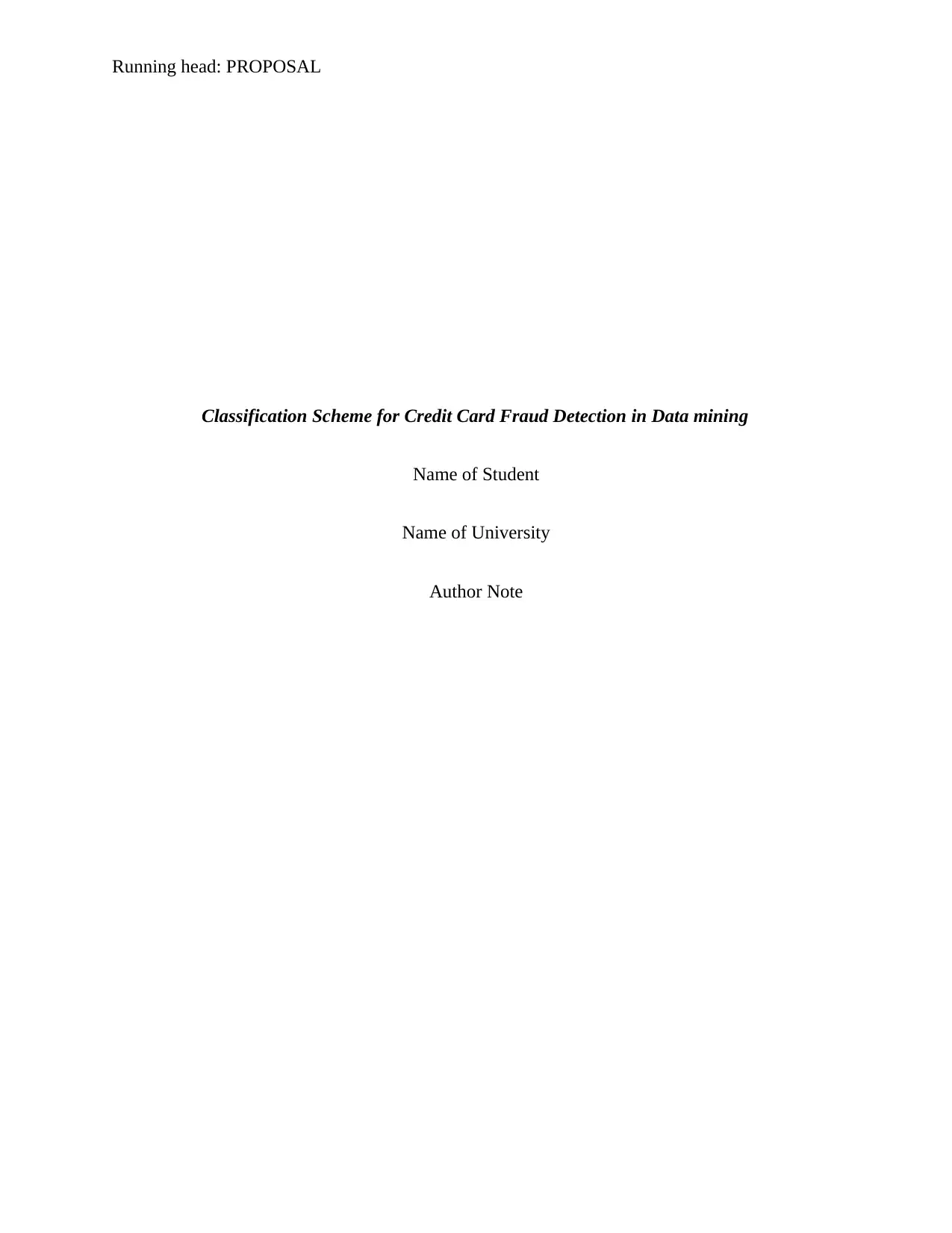
Running head: PROPOSAL
Classification Scheme for Credit Card Fraud Detection in Data mining
Name of Student
Name of University
Author Note
Classification Scheme for Credit Card Fraud Detection in Data mining
Name of Student
Name of University
Author Note
Paraphrase This Document
Need a fresh take? Get an instant paraphrase of this document with our AI Paraphraser
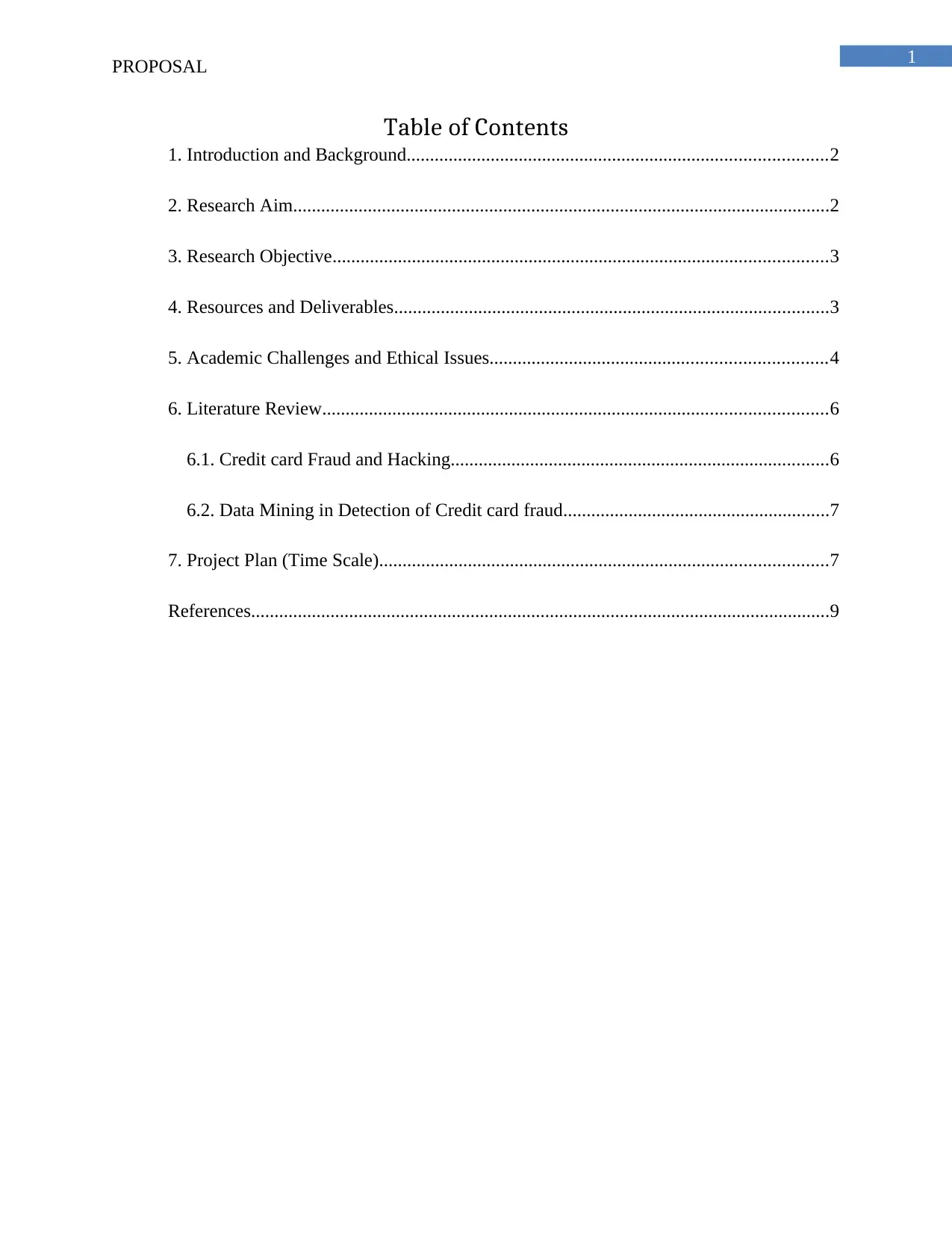
1
PROPOSAL
Table of Contents
1. Introduction and Background..........................................................................................2
2. Research Aim...................................................................................................................2
3. Research Objective..........................................................................................................3
4. Resources and Deliverables.............................................................................................3
5. Academic Challenges and Ethical Issues........................................................................4
6. Literature Review............................................................................................................6
6.1. Credit card Fraud and Hacking.................................................................................6
6.2. Data Mining in Detection of Credit card fraud.........................................................7
7. Project Plan (Time Scale)................................................................................................7
References............................................................................................................................9
PROPOSAL
Table of Contents
1. Introduction and Background..........................................................................................2
2. Research Aim...................................................................................................................2
3. Research Objective..........................................................................................................3
4. Resources and Deliverables.............................................................................................3
5. Academic Challenges and Ethical Issues........................................................................4
6. Literature Review............................................................................................................6
6.1. Credit card Fraud and Hacking.................................................................................6
6.2. Data Mining in Detection of Credit card fraud.........................................................7
7. Project Plan (Time Scale)................................................................................................7
References............................................................................................................................9
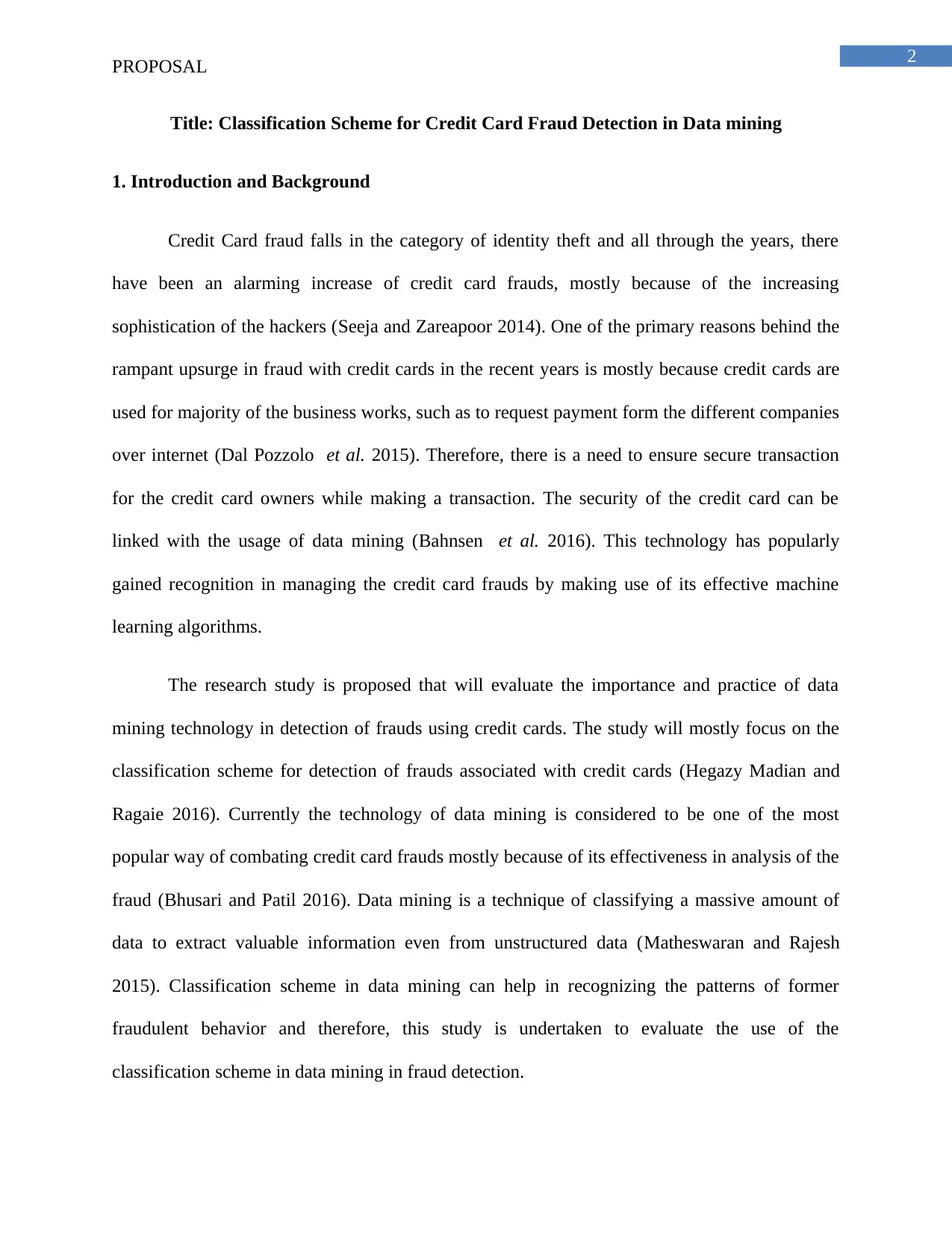
2
PROPOSAL
Title: Classification Scheme for Credit Card Fraud Detection in Data mining
1. Introduction and Background
Credit Card fraud falls in the category of identity theft and all through the years, there
have been an alarming increase of credit card frauds, mostly because of the increasing
sophistication of the hackers (Seeja and Zareapoor 2014). One of the primary reasons behind the
rampant upsurge in fraud with credit cards in the recent years is mostly because credit cards are
used for majority of the business works, such as to request payment form the different companies
over internet (Dal Pozzolo et al. 2015). Therefore, there is a need to ensure secure transaction
for the credit card owners while making a transaction. The security of the credit card can be
linked with the usage of data mining (Bahnsen et al. 2016). This technology has popularly
gained recognition in managing the credit card frauds by making use of its effective machine
learning algorithms.
The research study is proposed that will evaluate the importance and practice of data
mining technology in detection of frauds using credit cards. The study will mostly focus on the
classification scheme for detection of frauds associated with credit cards (Hegazy Madian and
Ragaie 2016). Currently the technology of data mining is considered to be one of the most
popular way of combating credit card frauds mostly because of its effectiveness in analysis of the
fraud (Bhusari and Patil 2016). Data mining is a technique of classifying a massive amount of
data to extract valuable information even from unstructured data (Matheswaran and Rajesh
2015). Classification scheme in data mining can help in recognizing the patterns of former
fraudulent behavior and therefore, this study is undertaken to evaluate the use of the
classification scheme in data mining in fraud detection.
PROPOSAL
Title: Classification Scheme for Credit Card Fraud Detection in Data mining
1. Introduction and Background
Credit Card fraud falls in the category of identity theft and all through the years, there
have been an alarming increase of credit card frauds, mostly because of the increasing
sophistication of the hackers (Seeja and Zareapoor 2014). One of the primary reasons behind the
rampant upsurge in fraud with credit cards in the recent years is mostly because credit cards are
used for majority of the business works, such as to request payment form the different companies
over internet (Dal Pozzolo et al. 2015). Therefore, there is a need to ensure secure transaction
for the credit card owners while making a transaction. The security of the credit card can be
linked with the usage of data mining (Bahnsen et al. 2016). This technology has popularly
gained recognition in managing the credit card frauds by making use of its effective machine
learning algorithms.
The research study is proposed that will evaluate the importance and practice of data
mining technology in detection of frauds using credit cards. The study will mostly focus on the
classification scheme for detection of frauds associated with credit cards (Hegazy Madian and
Ragaie 2016). Currently the technology of data mining is considered to be one of the most
popular way of combating credit card frauds mostly because of its effectiveness in analysis of the
fraud (Bhusari and Patil 2016). Data mining is a technique of classifying a massive amount of
data to extract valuable information even from unstructured data (Matheswaran and Rajesh
2015). Classification scheme in data mining can help in recognizing the patterns of former
fraudulent behavior and therefore, this study is undertaken to evaluate the use of the
classification scheme in data mining in fraud detection.
⊘ This is a preview!⊘
Do you want full access?
Subscribe today to unlock all pages.

Trusted by 1+ million students worldwide
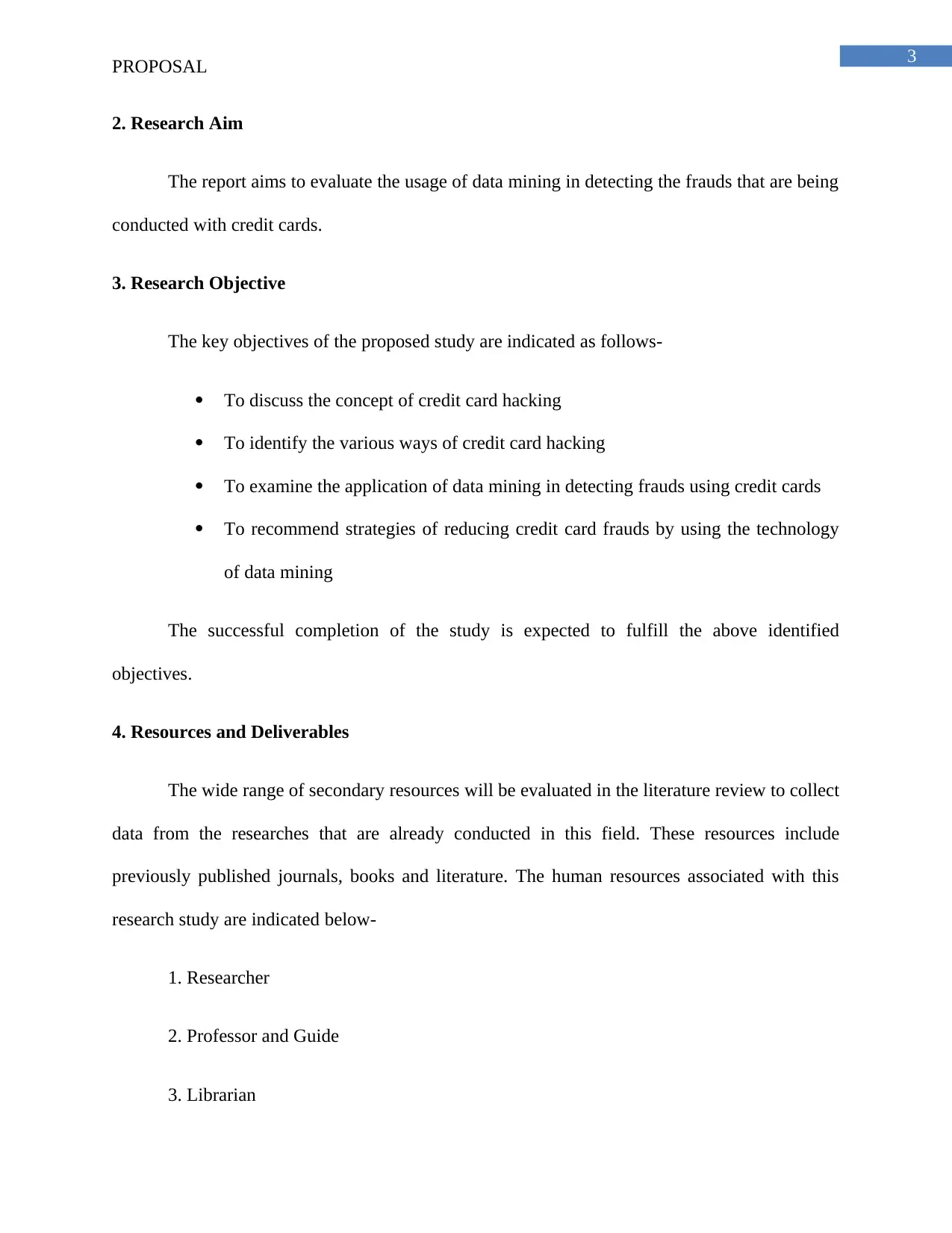
3
PROPOSAL
2. Research Aim
The report aims to evaluate the usage of data mining in detecting the frauds that are being
conducted with credit cards.
3. Research Objective
The key objectives of the proposed study are indicated as follows-
To discuss the concept of credit card hacking
To identify the various ways of credit card hacking
To examine the application of data mining in detecting frauds using credit cards
To recommend strategies of reducing credit card frauds by using the technology
of data mining
The successful completion of the study is expected to fulfill the above identified
objectives.
4. Resources and Deliverables
The wide range of secondary resources will be evaluated in the literature review to collect
data from the researches that are already conducted in this field. These resources include
previously published journals, books and literature. The human resources associated with this
research study are indicated below-
1. Researcher
2. Professor and Guide
3. Librarian
PROPOSAL
2. Research Aim
The report aims to evaluate the usage of data mining in detecting the frauds that are being
conducted with credit cards.
3. Research Objective
The key objectives of the proposed study are indicated as follows-
To discuss the concept of credit card hacking
To identify the various ways of credit card hacking
To examine the application of data mining in detecting frauds using credit cards
To recommend strategies of reducing credit card frauds by using the technology
of data mining
The successful completion of the study is expected to fulfill the above identified
objectives.
4. Resources and Deliverables
The wide range of secondary resources will be evaluated in the literature review to collect
data from the researches that are already conducted in this field. These resources include
previously published journals, books and literature. The human resources associated with this
research study are indicated below-
1. Researcher
2. Professor and Guide
3. Librarian
Paraphrase This Document
Need a fresh take? Get an instant paraphrase of this document with our AI Paraphraser
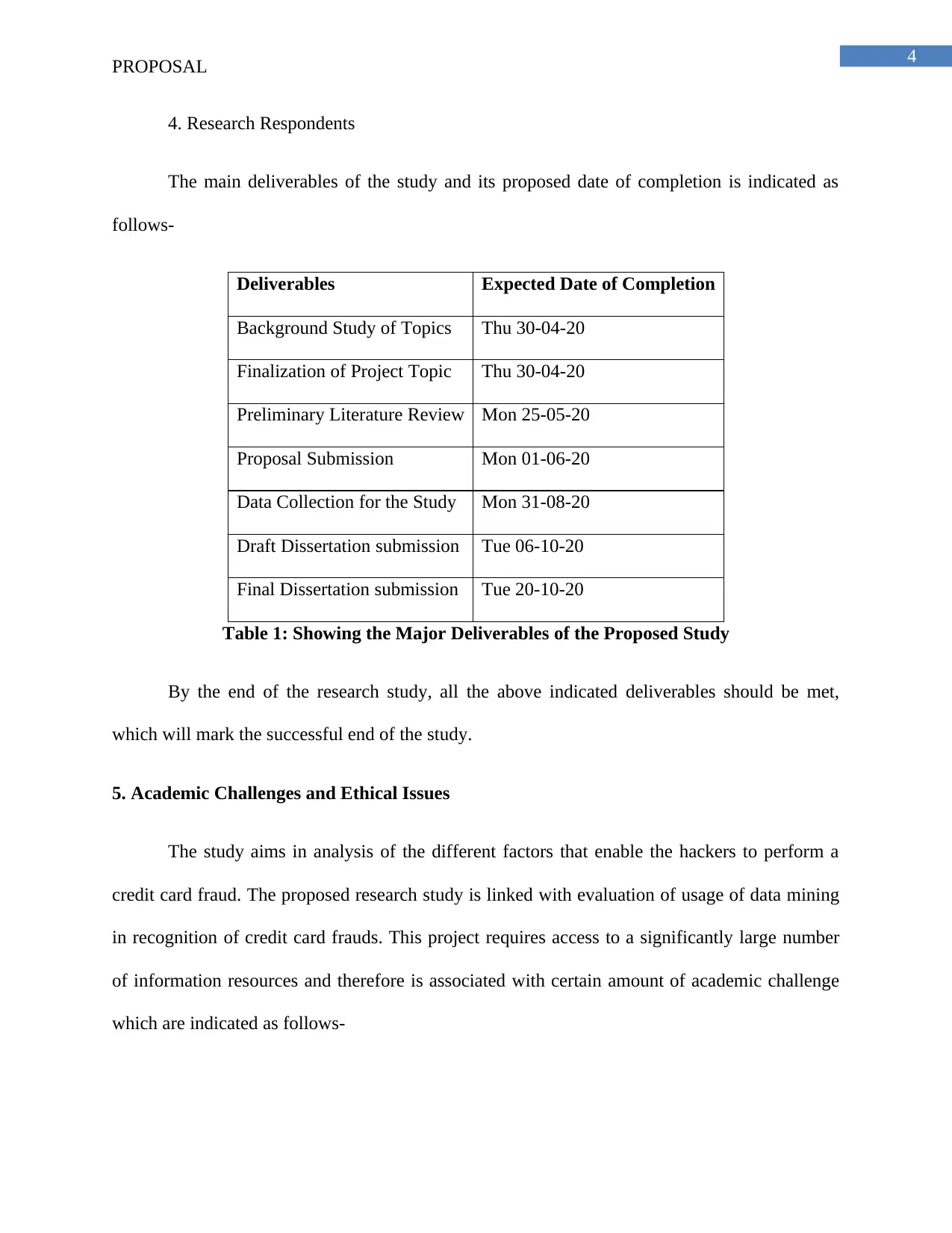
4
PROPOSAL
4. Research Respondents
The main deliverables of the study and its proposed date of completion is indicated as
follows-
Deliverables Expected Date of Completion
Background Study of Topics Thu 30-04-20
Finalization of Project Topic Thu 30-04-20
Preliminary Literature Review Mon 25-05-20
Proposal Submission Mon 01-06-20
Data Collection for the Study Mon 31-08-20
Draft Dissertation submission Tue 06-10-20
Final Dissertation submission Tue 20-10-20
Table 1: Showing the Major Deliverables of the Proposed Study
By the end of the research study, all the above indicated deliverables should be met,
which will mark the successful end of the study.
5. Academic Challenges and Ethical Issues
The study aims in analysis of the different factors that enable the hackers to perform a
credit card fraud. The proposed research study is linked with evaluation of usage of data mining
in recognition of credit card frauds. This project requires access to a significantly large number
of information resources and therefore is associated with certain amount of academic challenge
which are indicated as follows-
PROPOSAL
4. Research Respondents
The main deliverables of the study and its proposed date of completion is indicated as
follows-
Deliverables Expected Date of Completion
Background Study of Topics Thu 30-04-20
Finalization of Project Topic Thu 30-04-20
Preliminary Literature Review Mon 25-05-20
Proposal Submission Mon 01-06-20
Data Collection for the Study Mon 31-08-20
Draft Dissertation submission Tue 06-10-20
Final Dissertation submission Tue 20-10-20
Table 1: Showing the Major Deliverables of the Proposed Study
By the end of the research study, all the above indicated deliverables should be met,
which will mark the successful end of the study.
5. Academic Challenges and Ethical Issues
The study aims in analysis of the different factors that enable the hackers to perform a
credit card fraud. The proposed research study is linked with evaluation of usage of data mining
in recognition of credit card frauds. This project requires access to a significantly large number
of information resources and therefore is associated with certain amount of academic challenge
which are indicated as follows-
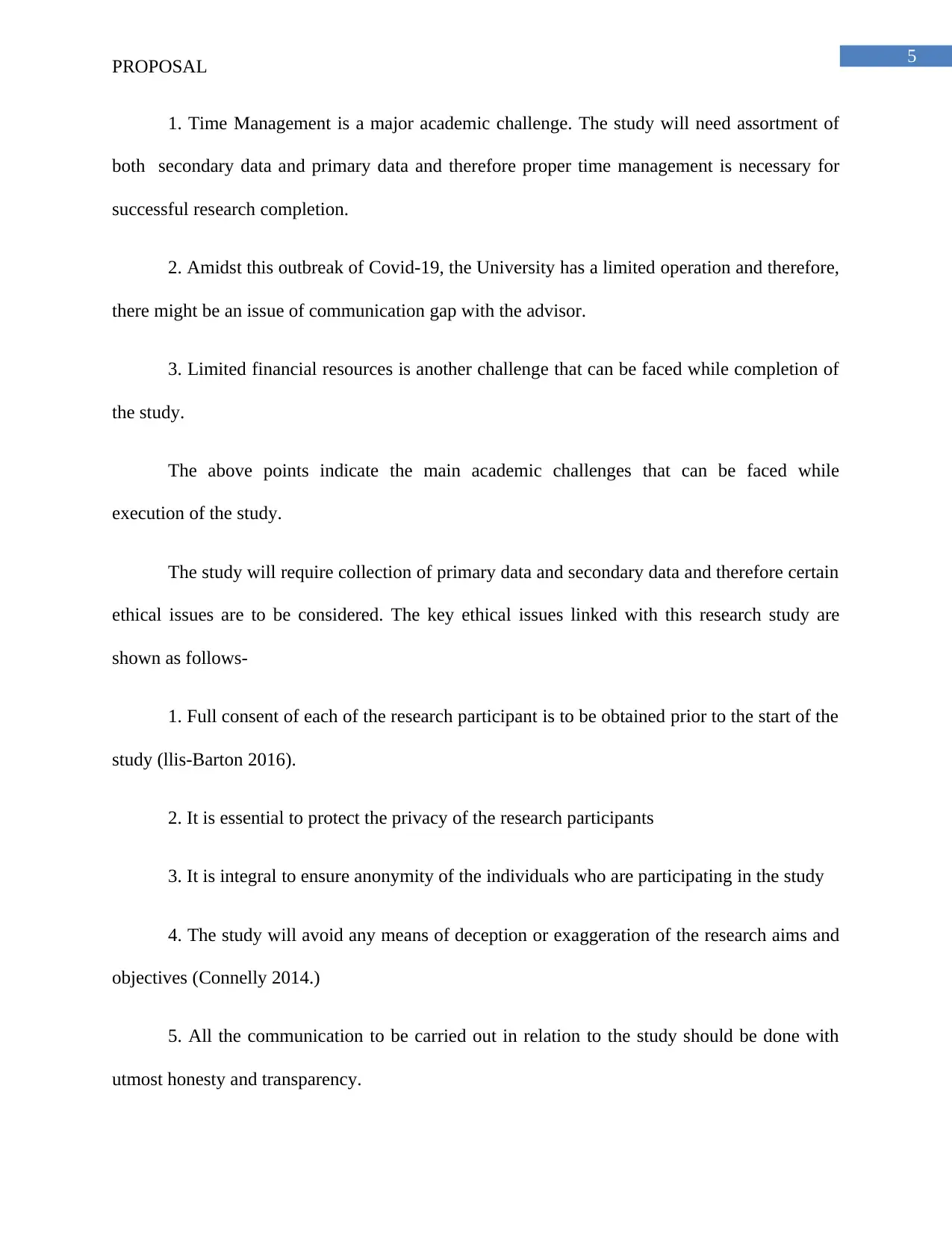
5
PROPOSAL
1. Time Management is a major academic challenge. The study will need assortment of
both secondary data and primary data and therefore proper time management is necessary for
successful research completion.
2. Amidst this outbreak of Covid-19, the University has a limited operation and therefore,
there might be an issue of communication gap with the advisor.
3. Limited financial resources is another challenge that can be faced while completion of
the study.
The above points indicate the main academic challenges that can be faced while
execution of the study.
The study will require collection of primary data and secondary data and therefore certain
ethical issues are to be considered. The key ethical issues linked with this research study are
shown as follows-
1. Full consent of each of the research participant is to be obtained prior to the start of the
study (llis-Barton 2016).
2. It is essential to protect the privacy of the research participants
3. It is integral to ensure anonymity of the individuals who are participating in the study
4. The study will avoid any means of deception or exaggeration of the research aims and
objectives (Connelly 2014.)
5. All the communication to be carried out in relation to the study should be done with
utmost honesty and transparency.
PROPOSAL
1. Time Management is a major academic challenge. The study will need assortment of
both secondary data and primary data and therefore proper time management is necessary for
successful research completion.
2. Amidst this outbreak of Covid-19, the University has a limited operation and therefore,
there might be an issue of communication gap with the advisor.
3. Limited financial resources is another challenge that can be faced while completion of
the study.
The above points indicate the main academic challenges that can be faced while
execution of the study.
The study will require collection of primary data and secondary data and therefore certain
ethical issues are to be considered. The key ethical issues linked with this research study are
shown as follows-
1. Full consent of each of the research participant is to be obtained prior to the start of the
study (llis-Barton 2016).
2. It is essential to protect the privacy of the research participants
3. It is integral to ensure anonymity of the individuals who are participating in the study
4. The study will avoid any means of deception or exaggeration of the research aims and
objectives (Connelly 2014.)
5. All the communication to be carried out in relation to the study should be done with
utmost honesty and transparency.
⊘ This is a preview!⊘
Do you want full access?
Subscribe today to unlock all pages.

Trusted by 1+ million students worldwide
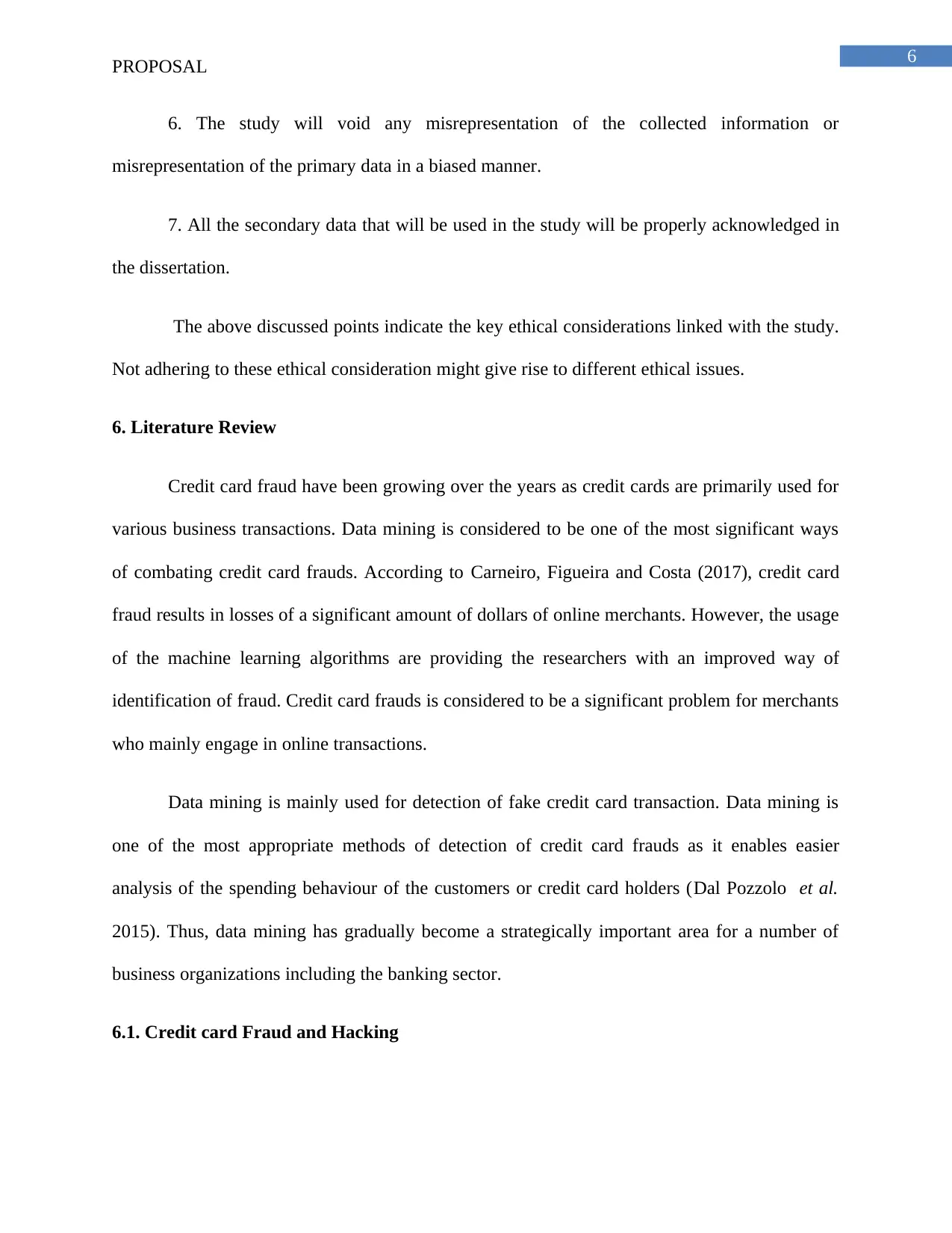
6
PROPOSAL
6. The study will void any misrepresentation of the collected information or
misrepresentation of the primary data in a biased manner.
7. All the secondary data that will be used in the study will be properly acknowledged in
the dissertation.
The above discussed points indicate the key ethical considerations linked with the study.
Not adhering to these ethical consideration might give rise to different ethical issues.
6. Literature Review
Credit card fraud have been growing over the years as credit cards are primarily used for
various business transactions. Data mining is considered to be one of the most significant ways
of combating credit card frauds. According to Carneiro, Figueira and Costa (2017), credit card
fraud results in losses of a significant amount of dollars of online merchants. However, the usage
of the machine learning algorithms are providing the researchers with an improved way of
identification of fraud. Credit card frauds is considered to be a significant problem for merchants
who mainly engage in online transactions.
Data mining is mainly used for detection of fake credit card transaction. Data mining is
one of the most appropriate methods of detection of credit card frauds as it enables easier
analysis of the spending behaviour of the customers or credit card holders (Dal Pozzolo et al.
2015). Thus, data mining has gradually become a strategically important area for a number of
business organizations including the banking sector.
6.1. Credit card Fraud and Hacking
PROPOSAL
6. The study will void any misrepresentation of the collected information or
misrepresentation of the primary data in a biased manner.
7. All the secondary data that will be used in the study will be properly acknowledged in
the dissertation.
The above discussed points indicate the key ethical considerations linked with the study.
Not adhering to these ethical consideration might give rise to different ethical issues.
6. Literature Review
Credit card fraud have been growing over the years as credit cards are primarily used for
various business transactions. Data mining is considered to be one of the most significant ways
of combating credit card frauds. According to Carneiro, Figueira and Costa (2017), credit card
fraud results in losses of a significant amount of dollars of online merchants. However, the usage
of the machine learning algorithms are providing the researchers with an improved way of
identification of fraud. Credit card frauds is considered to be a significant problem for merchants
who mainly engage in online transactions.
Data mining is mainly used for detection of fake credit card transaction. Data mining is
one of the most appropriate methods of detection of credit card frauds as it enables easier
analysis of the spending behaviour of the customers or credit card holders (Dal Pozzolo et al.
2015). Thus, data mining has gradually become a strategically important area for a number of
business organizations including the banking sector.
6.1. Credit card Fraud and Hacking
Paraphrase This Document
Need a fresh take? Get an instant paraphrase of this document with our AI Paraphraser
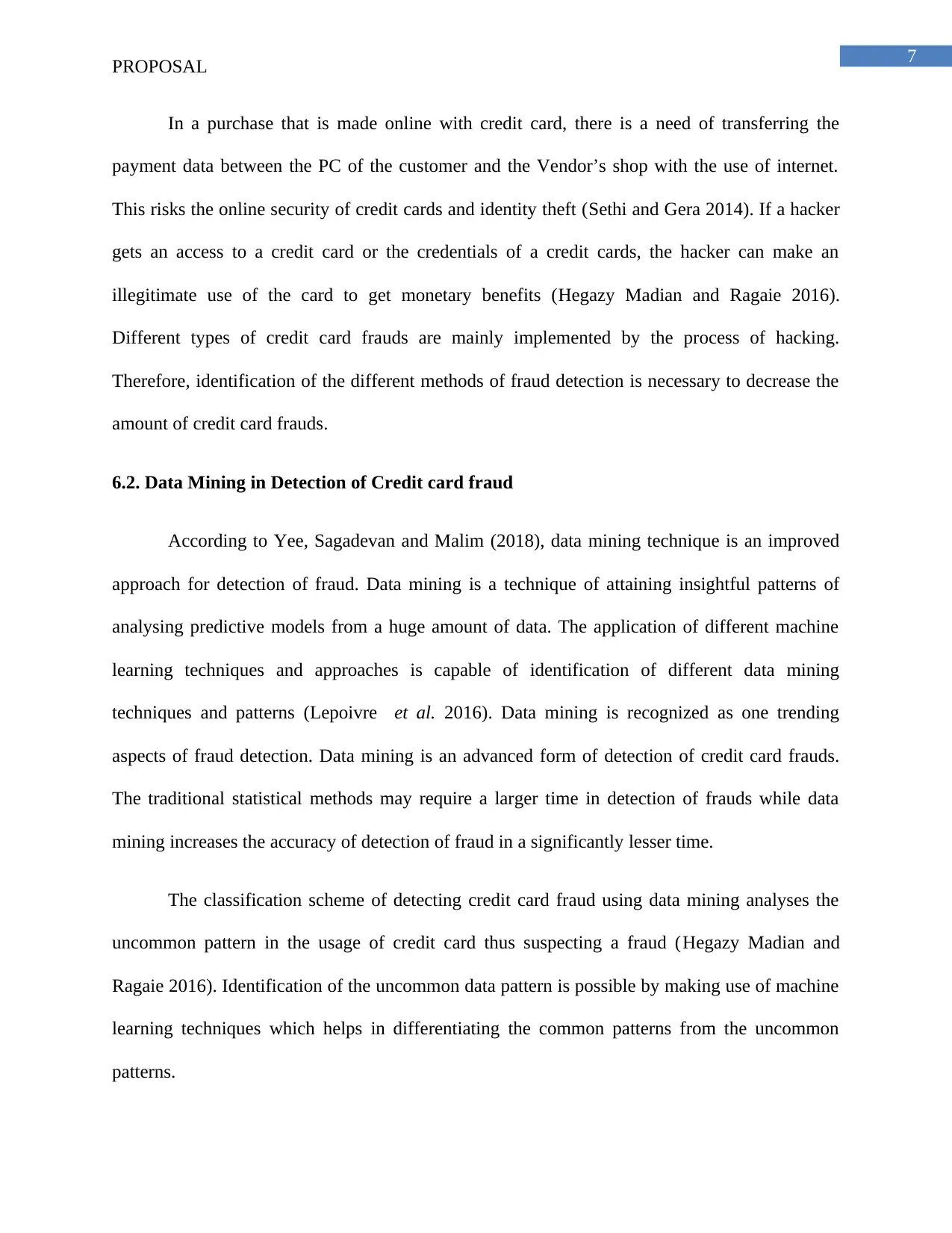
7
PROPOSAL
In a purchase that is made online with credit card, there is a need of transferring the
payment data between the PC of the customer and the Vendor’s shop with the use of internet.
This risks the online security of credit cards and identity theft (Sethi and Gera 2014). If a hacker
gets an access to a credit card or the credentials of a credit cards, the hacker can make an
illegitimate use of the card to get monetary benefits (Hegazy Madian and Ragaie 2016).
Different types of credit card frauds are mainly implemented by the process of hacking.
Therefore, identification of the different methods of fraud detection is necessary to decrease the
amount of credit card frauds.
6.2. Data Mining in Detection of Credit card fraud
According to Yee, Sagadevan and Malim (2018), data mining technique is an improved
approach for detection of fraud. Data mining is a technique of attaining insightful patterns of
analysing predictive models from a huge amount of data. The application of different machine
learning techniques and approaches is capable of identification of different data mining
techniques and patterns (Lepoivre et al. 2016). Data mining is recognized as one trending
aspects of fraud detection. Data mining is an advanced form of detection of credit card frauds.
The traditional statistical methods may require a larger time in detection of frauds while data
mining increases the accuracy of detection of fraud in a significantly lesser time.
The classification scheme of detecting credit card fraud using data mining analyses the
uncommon pattern in the usage of credit card thus suspecting a fraud (Hegazy Madian and
Ragaie 2016). Identification of the uncommon data pattern is possible by making use of machine
learning techniques which helps in differentiating the common patterns from the uncommon
patterns.
PROPOSAL
In a purchase that is made online with credit card, there is a need of transferring the
payment data between the PC of the customer and the Vendor’s shop with the use of internet.
This risks the online security of credit cards and identity theft (Sethi and Gera 2014). If a hacker
gets an access to a credit card or the credentials of a credit cards, the hacker can make an
illegitimate use of the card to get monetary benefits (Hegazy Madian and Ragaie 2016).
Different types of credit card frauds are mainly implemented by the process of hacking.
Therefore, identification of the different methods of fraud detection is necessary to decrease the
amount of credit card frauds.
6.2. Data Mining in Detection of Credit card fraud
According to Yee, Sagadevan and Malim (2018), data mining technique is an improved
approach for detection of fraud. Data mining is a technique of attaining insightful patterns of
analysing predictive models from a huge amount of data. The application of different machine
learning techniques and approaches is capable of identification of different data mining
techniques and patterns (Lepoivre et al. 2016). Data mining is recognized as one trending
aspects of fraud detection. Data mining is an advanced form of detection of credit card frauds.
The traditional statistical methods may require a larger time in detection of frauds while data
mining increases the accuracy of detection of fraud in a significantly lesser time.
The classification scheme of detecting credit card fraud using data mining analyses the
uncommon pattern in the usage of credit card thus suspecting a fraud (Hegazy Madian and
Ragaie 2016). Identification of the uncommon data pattern is possible by making use of machine
learning techniques which helps in differentiating the common patterns from the uncommon
patterns.
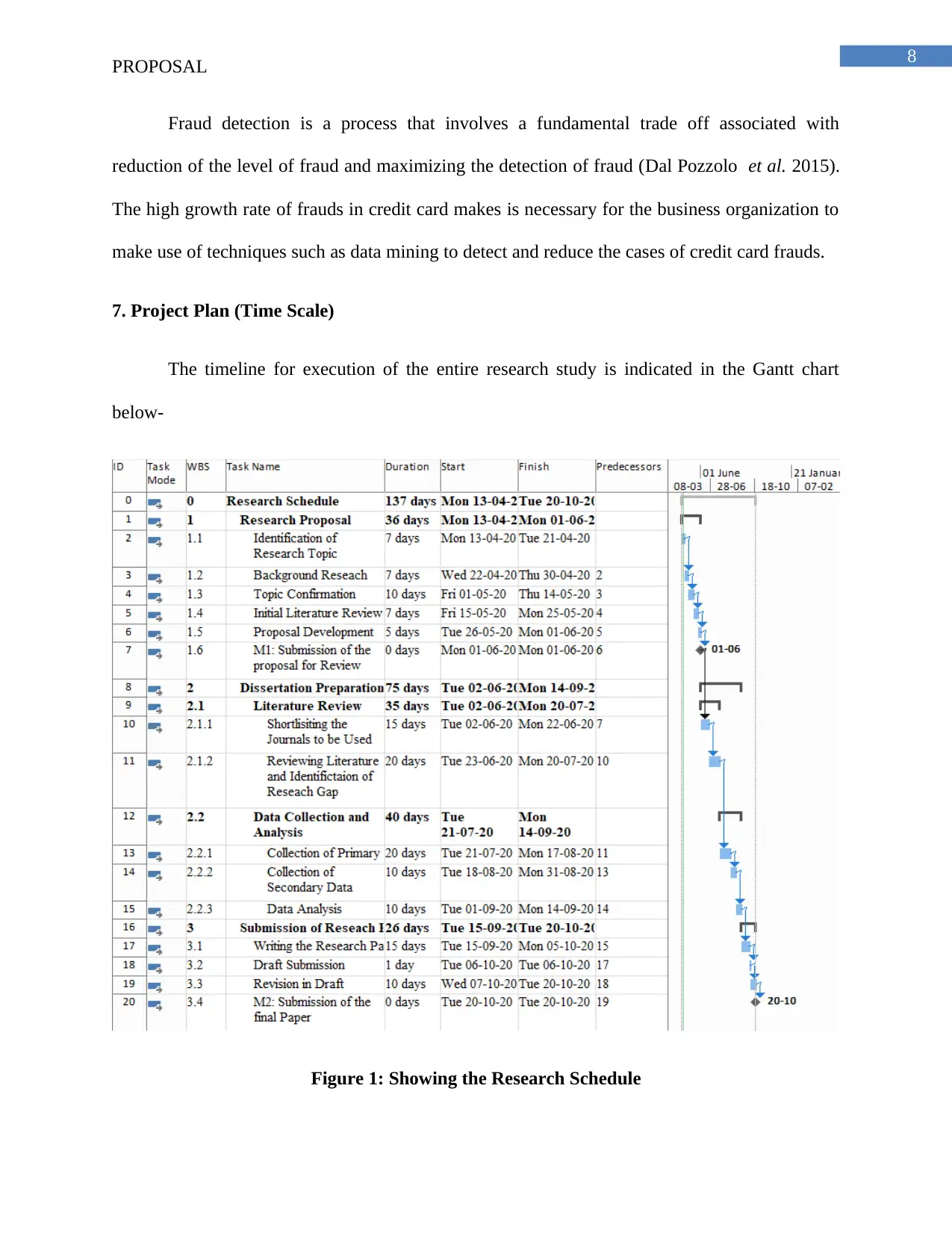
8
PROPOSAL
Fraud detection is a process that involves a fundamental trade off associated with
reduction of the level of fraud and maximizing the detection of fraud (Dal Pozzolo et al. 2015).
The high growth rate of frauds in credit card makes is necessary for the business organization to
make use of techniques such as data mining to detect and reduce the cases of credit card frauds.
7. Project Plan (Time Scale)
The timeline for execution of the entire research study is indicated in the Gantt chart
below-
Figure 1: Showing the Research Schedule
PROPOSAL
Fraud detection is a process that involves a fundamental trade off associated with
reduction of the level of fraud and maximizing the detection of fraud (Dal Pozzolo et al. 2015).
The high growth rate of frauds in credit card makes is necessary for the business organization to
make use of techniques such as data mining to detect and reduce the cases of credit card frauds.
7. Project Plan (Time Scale)
The timeline for execution of the entire research study is indicated in the Gantt chart
below-
Figure 1: Showing the Research Schedule
⊘ This is a preview!⊘
Do you want full access?
Subscribe today to unlock all pages.

Trusted by 1+ million students worldwide
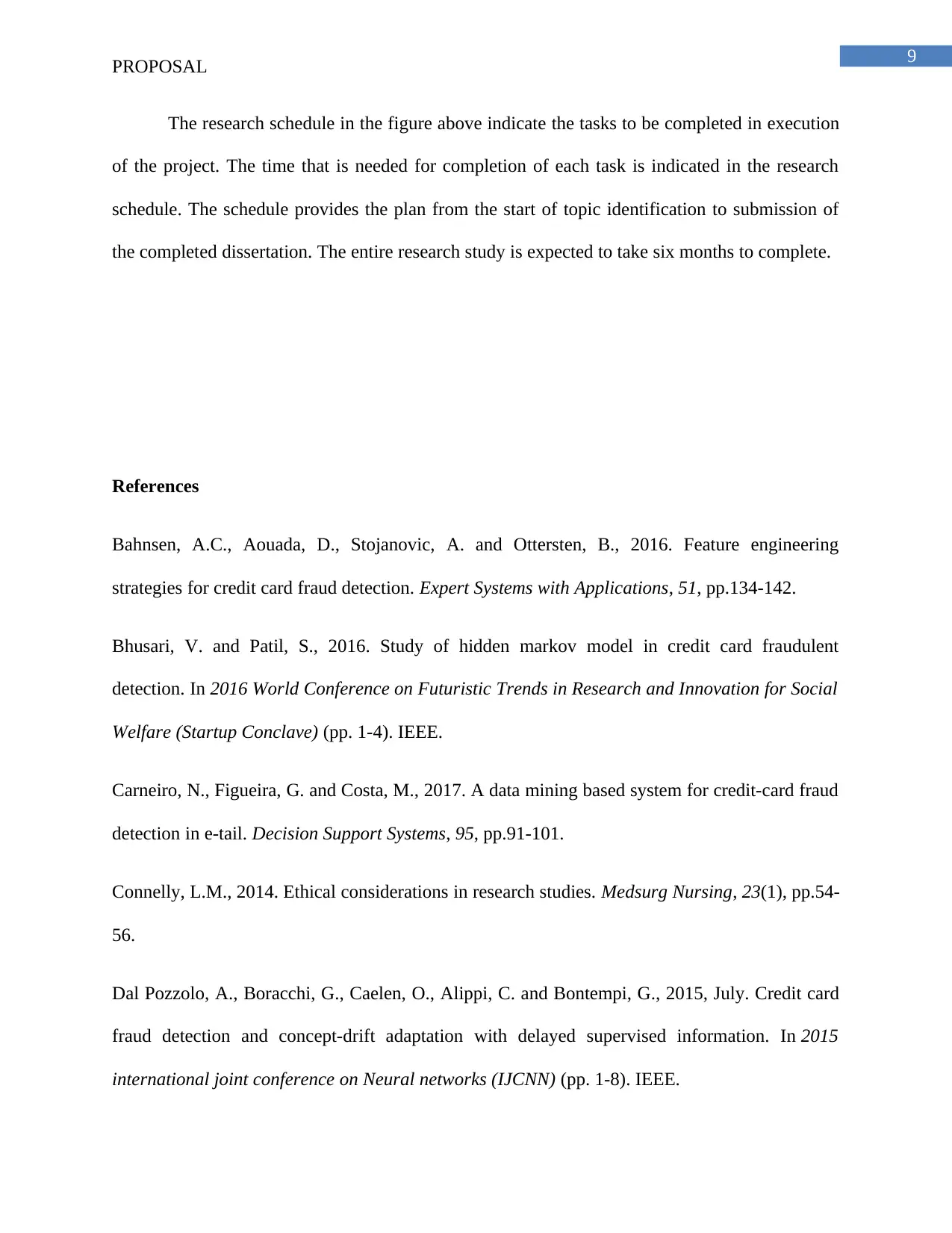
9
PROPOSAL
The research schedule in the figure above indicate the tasks to be completed in execution
of the project. The time that is needed for completion of each task is indicated in the research
schedule. The schedule provides the plan from the start of topic identification to submission of
the completed dissertation. The entire research study is expected to take six months to complete.
References
Bahnsen, A.C., Aouada, D., Stojanovic, A. and Ottersten, B., 2016. Feature engineering
strategies for credit card fraud detection. Expert Systems with Applications, 51, pp.134-142.
Bhusari, V. and Patil, S., 2016. Study of hidden markov model in credit card fraudulent
detection. In 2016 World Conference on Futuristic Trends in Research and Innovation for Social
Welfare (Startup Conclave) (pp. 1-4). IEEE.
Carneiro, N., Figueira, G. and Costa, M., 2017. A data mining based system for credit-card fraud
detection in e-tail. Decision Support Systems, 95, pp.91-101.
Connelly, L.M., 2014. Ethical considerations in research studies. Medsurg Nursing, 23(1), pp.54-
56.
Dal Pozzolo, A., Boracchi, G., Caelen, O., Alippi, C. and Bontempi, G., 2015, July. Credit card
fraud detection and concept-drift adaptation with delayed supervised information. In 2015
international joint conference on Neural networks (IJCNN) (pp. 1-8). IEEE.
PROPOSAL
The research schedule in the figure above indicate the tasks to be completed in execution
of the project. The time that is needed for completion of each task is indicated in the research
schedule. The schedule provides the plan from the start of topic identification to submission of
the completed dissertation. The entire research study is expected to take six months to complete.
References
Bahnsen, A.C., Aouada, D., Stojanovic, A. and Ottersten, B., 2016. Feature engineering
strategies for credit card fraud detection. Expert Systems with Applications, 51, pp.134-142.
Bhusari, V. and Patil, S., 2016. Study of hidden markov model in credit card fraudulent
detection. In 2016 World Conference on Futuristic Trends in Research and Innovation for Social
Welfare (Startup Conclave) (pp. 1-4). IEEE.
Carneiro, N., Figueira, G. and Costa, M., 2017. A data mining based system for credit-card fraud
detection in e-tail. Decision Support Systems, 95, pp.91-101.
Connelly, L.M., 2014. Ethical considerations in research studies. Medsurg Nursing, 23(1), pp.54-
56.
Dal Pozzolo, A., Boracchi, G., Caelen, O., Alippi, C. and Bontempi, G., 2015, July. Credit card
fraud detection and concept-drift adaptation with delayed supervised information. In 2015
international joint conference on Neural networks (IJCNN) (pp. 1-8). IEEE.
Paraphrase This Document
Need a fresh take? Get an instant paraphrase of this document with our AI Paraphraser
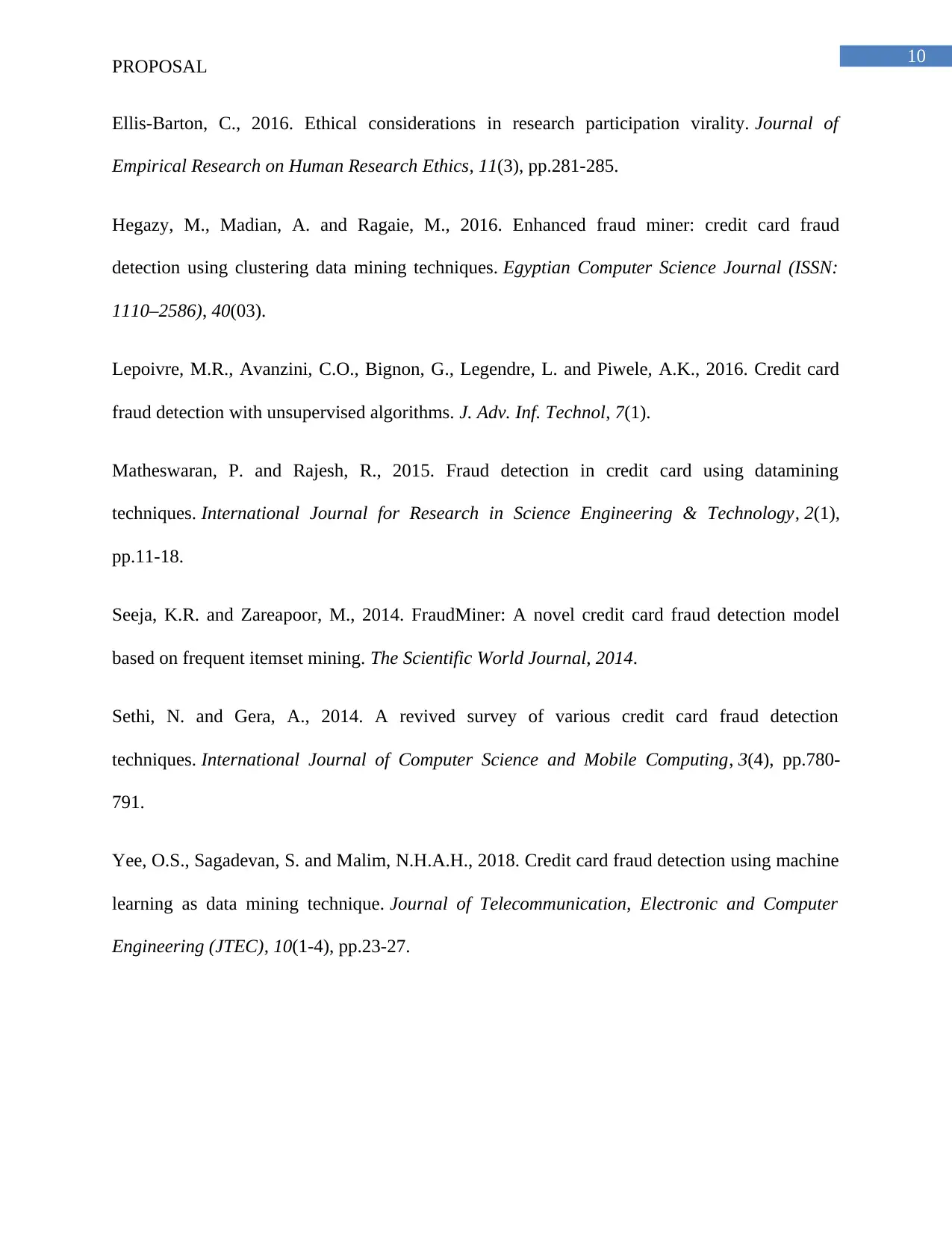
10
PROPOSAL
Ellis-Barton, C., 2016. Ethical considerations in research participation virality. Journal of
Empirical Research on Human Research Ethics, 11(3), pp.281-285.
Hegazy, M., Madian, A. and Ragaie, M., 2016. Enhanced fraud miner: credit card fraud
detection using clustering data mining techniques. Egyptian Computer Science Journal (ISSN:
1110–2586), 40(03).
Lepoivre, M.R., Avanzini, C.O., Bignon, G., Legendre, L. and Piwele, A.K., 2016. Credit card
fraud detection with unsupervised algorithms. J. Adv. Inf. Technol, 7(1).
Matheswaran, P. and Rajesh, R., 2015. Fraud detection in credit card using datamining
techniques. International Journal for Research in Science Engineering & Technology, 2(1),
pp.11-18.
Seeja, K.R. and Zareapoor, M., 2014. FraudMiner: A novel credit card fraud detection model
based on frequent itemset mining. The Scientific World Journal, 2014.
Sethi, N. and Gera, A., 2014. A revived survey of various credit card fraud detection
techniques. International Journal of Computer Science and Mobile Computing, 3(4), pp.780-
791.
Yee, O.S., Sagadevan, S. and Malim, N.H.A.H., 2018. Credit card fraud detection using machine
learning as data mining technique. Journal of Telecommunication, Electronic and Computer
Engineering (JTEC), 10(1-4), pp.23-27.
PROPOSAL
Ellis-Barton, C., 2016. Ethical considerations in research participation virality. Journal of
Empirical Research on Human Research Ethics, 11(3), pp.281-285.
Hegazy, M., Madian, A. and Ragaie, M., 2016. Enhanced fraud miner: credit card fraud
detection using clustering data mining techniques. Egyptian Computer Science Journal (ISSN:
1110–2586), 40(03).
Lepoivre, M.R., Avanzini, C.O., Bignon, G., Legendre, L. and Piwele, A.K., 2016. Credit card
fraud detection with unsupervised algorithms. J. Adv. Inf. Technol, 7(1).
Matheswaran, P. and Rajesh, R., 2015. Fraud detection in credit card using datamining
techniques. International Journal for Research in Science Engineering & Technology, 2(1),
pp.11-18.
Seeja, K.R. and Zareapoor, M., 2014. FraudMiner: A novel credit card fraud detection model
based on frequent itemset mining. The Scientific World Journal, 2014.
Sethi, N. and Gera, A., 2014. A revived survey of various credit card fraud detection
techniques. International Journal of Computer Science and Mobile Computing, 3(4), pp.780-
791.
Yee, O.S., Sagadevan, S. and Malim, N.H.A.H., 2018. Credit card fraud detection using machine
learning as data mining technique. Journal of Telecommunication, Electronic and Computer
Engineering (JTEC), 10(1-4), pp.23-27.

11
PROPOSAL
PROPOSAL
⊘ This is a preview!⊘
Do you want full access?
Subscribe today to unlock all pages.

Trusted by 1+ million students worldwide
1 out of 12
Related Documents
Your All-in-One AI-Powered Toolkit for Academic Success.
+13062052269
info@desklib.com
Available 24*7 on WhatsApp / Email
![[object Object]](/_next/static/media/star-bottom.7253800d.svg)
Unlock your academic potential
Copyright © 2020–2026 A2Z Services. All Rights Reserved. Developed and managed by ZUCOL.





